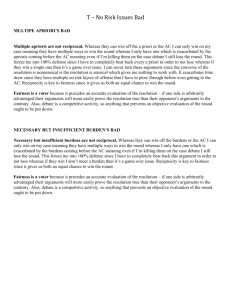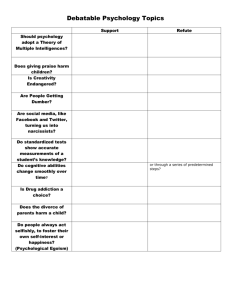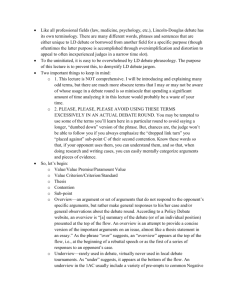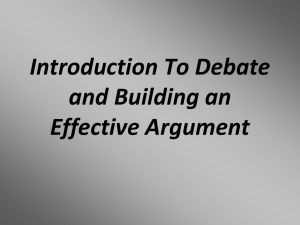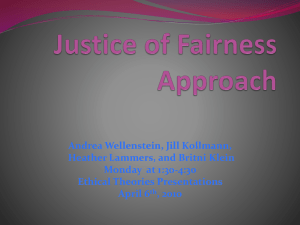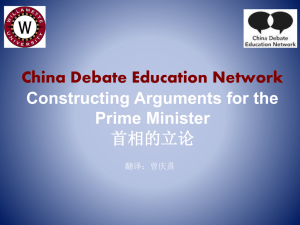Theory Frontlines
advertisement
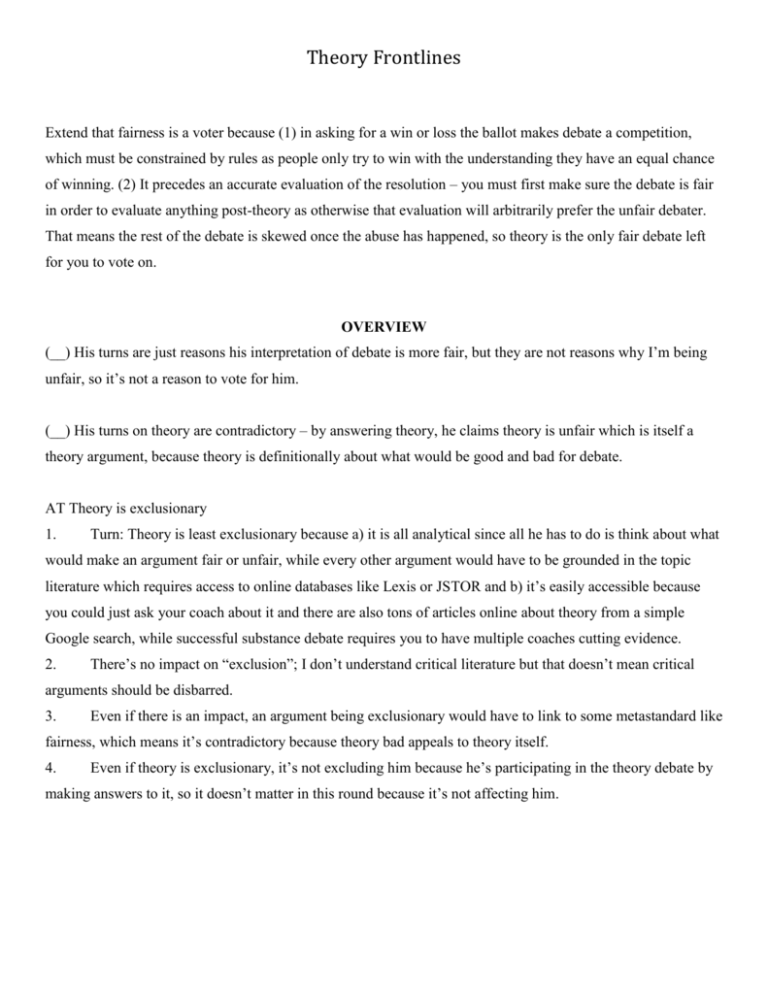
Theory Frontlines Extend that fairness is a voter because (1) in asking for a win or loss the ballot makes debate a competition, which must be constrained by rules as people only try to win with the understanding they have an equal chance of winning. (2) It precedes an accurate evaluation of the resolution – you must first make sure the debate is fair in order to evaluate anything post-theory as otherwise that evaluation will arbitrarily prefer the unfair debater. That means the rest of the debate is skewed once the abuse has happened, so theory is the only fair debate left for you to vote on. OVERVIEW (__) His turns are just reasons his interpretation of debate is more fair, but they are not reasons why I’m being unfair, so it’s not a reason to vote for him. (__) His turns on theory are contradictory – by answering theory, he claims theory is unfair which is itself a theory argument, because theory is definitionally about what would be good and bad for debate. AT Theory is exclusionary 1. Turn: Theory is least exclusionary because a) it is all analytical since all he has to do is think about what would make an argument fair or unfair, while every other argument would have to be grounded in the topic literature which requires access to online databases like Lexis or JSTOR and b) it’s easily accessible because you could just ask your coach about it and there are also tons of articles online about theory from a simple Google search, while successful substance debate requires you to have multiple coaches cutting evidence. 2. There’s no impact on “exclusion”; I don’t understand critical literature but that doesn’t mean critical arguments should be disbarred. 3. Even if there is an impact, an argument being exclusionary would have to link to some metastandard like fairness, which means it’s contradictory because theory bad appeals to theory itself. 4. Even if theory is exclusionary, it’s not excluding him because he’s participating in the theory debate by making answers to it, so it doesn’t matter in this round because it’s not affecting him. Theory Frontlines AT Theory is used only to win debate rounds, not actually check abuse b/c we put a voter on fairness 1. We attach a voter on fairness because it’s the only sufficient punishment for checking abuse. If we just lectured him on it after the round, that doesn’t deter him from continuing to run it in the future because there’s no consequence and he has an incentive to do so if he wins on it; by giving him the loss he realizes that abusive positions will lose and stop running them. AT theory is contradictory to its original purpose b/c people only get aggravated by it and don’t actually stop running their abusive positions but actually gives them incentive to run more 1. There’s no warrant why because a small minority of people are aggravated by theory would lead to a greater incentive to run abusive positions. If they continually lose on theory debates, then they’ll stop running abusive positions no matter how aggravated they are. 2. This is not a reason why theory isn’t effective for checking abusive arguments on the whole. That most people debate substantively and don’t run abusive positions empirically proves this true – for instance, ellipsis largely disappeared after Mike Spirtos won a lot of rounds off ellipsis bad theory. AT theory is unfair because the rules aren't established until the shell is read so it’s the ultimate abuse because he doesn't know what those rules are, only the debater who introduced them does 1. The NC is the earliest possible time to introduce theory. I had no other options. 2. It’s his fault as he should be prepared to engage theory – he could have just asked his coach about them 3. In turning my theory arguments, he establishes counter-rules about theory, which non-uniques the abuse. 4. That he’s answering the fairness voter means that he knows how to engage theory, and that fairness is premised on reciprocal burdens – any part of the case that destroys reciprocity is unfair, so he still should have known that his case was unfair even if he didn’t know the specific rule he’s violating. 5. The in-round abuse outweighs because 1. The “unfair” theory arguments are only read in response to check the abuse of an already unfair case and 2. He can still beat back theory with pre-prepared generic responses like the ones he’s making, or fairness-is-not-a voter args. Moreover, he’s still debated against generic theory standards like ground before even if he doesn’t know his specific violation, whereas my answers have to be case-specific to win a substantive debate. Theory Frontlines AT theory is unfair because skews access to substantive arguments made in the AC which denies ground on substance and he has to overcover on theory, then neg can just kick the theory leading to undercoverage on substance – 1. Theory is my only check against abusive positions – there’s nothing else to prevent people from cheating. 2. It’s his fault – if he wasn’t abusive in the first place, I wouldn’t have run theory and we could have just debated substantively. 3. I’m not kicking the theory and I’m allocating more time responding now, so there’s no time skew because I took [ time ] to read the shell in the NC and now I’m spending a ton of time extending theory. (___) That I’m not going for answers to substance and I’m going all in on theory demonstrates the magnitude of the abuse. That I’m not answering substance at all means there’s no way he undercover my responses. A/T Theory is subjective and leads to intervention 1. Theory is objectively evaluated just like any other argument on the flow – the judge looks at each argument and evaluates the quality of the responses in relation to the original argument. They’re not intervening – there are clearly established standards for what fairness is, and they can evaluate consistency with those. 2. You’re intervening more if you disregard theory and evaluate the post-theory debate, because the rest of the debate has already been skewed by the abuse. Crossapply the second warrant in the voter which proves this. 3. Nonunique – they put offense on theory by saying […], which means any intervention that results from running theory could swing in their direction also. Theory Frontlines A/T Fairness is not a voter 1. (Reexplain the voter. . . the warrants are preclusive of all responses) 2. Their arguments concede fairness is still necessary as a check on argumentation in debate because fairness frames all discussions. Since they concede fairness is necessary for an objective evaluation of the round since without it, everything is skewed it means that all of their answers are defensive at best. Also, this outweighs all my opponent’s technical responses because fairness is necessary to evaluate the flow at all. 3. Even if fairness is flawed, there has to be some meta-standard by which we evaluate the rules of debate because there have to be conditions that demonstrate what’s sufficient to prove or disprove the resolution. They are not leveraging a counter-interpretation of how to frame the round, for instance education, so you default to fairness regardless of the responses they are making to it. 4. Many of their arguments rest on shared assumptions, which are taken out by various line-by-line arguments I am going to make, so you should crossapply all of the answers I am going to make to their entire position. A/T Text precedes fairness 1. There are an infinite number of grammatically correct ways to interpret any given statement, but we need fairness to determine which ones are legitimate in order to establish conditions that allow us to debate the resolution. 2. Textual interpretations are always justified in terms of reasons to prefer that ultimately terminate in some theoretical reason. Fairness is the only theoretical reason that is being justified in this round so default to it as a filter for textual interpretations. 3. Crossapply the second warrant in the voter – the debate about text is skewed if one side is given a structural advantage, so you cannot determine who is winning the debate about text until you first evaluate theory. Theory Frontlines A/T Logic precedes fairness 1. The only impact off this argument is prefer logic. This DOES NOT MEAN that truth comes first, because theory arguments are also derived from logic. If his arguments are logically unfair, then you [negate]. AT: No brightline to fairness 1. The bright line to fairness is structural abuse – the point at which they can do something that I cannot, fairness has been violated. This is established by my theory standard of (…) because. . . 2. Exact bright lines are unnecessary. If I handed you a color gradient you could not tell me exactly where it changes from yellow to orange but that does not mean they are not distinct colors. 3. A clear bright line is unnecessary in this instance because the in round abuse is so bad, thus we know he has crossed the bright line even if we don’t know exactly where that is. 4. There’s no warrant why brightlines matter anyway – seriously, is there any debate argument or even anything in the real world that has a brightline!? Stop fooling yourself, this argument sucks. AT: Make theory defensive, not offensive 1. Voting on theory is the only way to truly rectify the abuse since it’s the only way I can garner offense on an issue that would otherwise be no risk. Theory Frontlines AT: I’m kicking the argument so there’s no abuse. 1. He concedes the warrants in my fairness voter that unfair arguments arbitrarily advantage one debater which prevents an accurate evaluation of the round. Once an abusive practice is enacted the round will always be skewed towards one debater meaning at that point you can’t evaluate anything post-theory. Since theory is the only fair debate left for you to vote on – you pull the trigger on it since the abuse already happened in the NC. 2. Kicking the argument only proves the abuse – if I never ran theory then they’d definitely be going for the burden since I undercovered it because of the time skewed by their no risk spread and me having to run theory. If they didn’t recognize their argument was abusive then they’d just make the “no abuse” response, then take the most strategic option of winning a preclusive argument with little ink on it. Even so, saying the fact the argument is kicked means there’s no abuse means that it could have been extended to abuse me, and since they would have extended the argument had I not run theory, voting on theory is key to checking back the abusive practice. AT: Drop the argument, not the debater 1. You can’t just cross arguments out of the round since you can never separate an argument from your mind. Crossed out arguments have already interacted with other arguments in the round and created an impression on you as a judge and discredited other arguments. Even if we cross them out they’ve already had implications on the round. For instance, if I make a racist joke, even if we cross that joke out of the round, I’m still perceived as a racist for the entire round, and that affects how you as a judge views the debate. 2. He concedes the warrants in my fairness voter that unfair arguments arbitrarily advantage one debater which prevents an accurate evaluation of the round. Once an abusive practice is enacted the round will always be skewed towards one debater meaning at that point you can’t evaluate anything post-theory. Since theory is the only fair debate left for you to vote on – you pull the trigger on it since the abuse already happened in the NC. Theory Frontlines AT: It’s not reciprocal for the aff to have offense on theory while I don’t 1. It’s their fault - I had no choice other than to run theory in order to check the abuse. Whereas they could have just not run the unfair arguments in the first place, they forced me to make theory an advocacy. 2. Theory is reciprocal because both of us have to be fair in order to win, meaning I have to meet the burden of being fair also. 3. They can get offense on theory by winning that it is a reverse voting issue – they could have just argued that if I can win on theory, in the interests of reciprocity that defense should be sufficient for them to win on it. It’s their fault for not framing theory as a two way street. 4. Theory is a gateway issue that must be evaluated prior to the rest of the substantive debate. It frames how we view arguments on the case debate, so it doesn’t have to function in the same way they do. Just because on case arguments have to be reciprocal, that doesn’t mean theory arguments have to be reciprocal as well.

